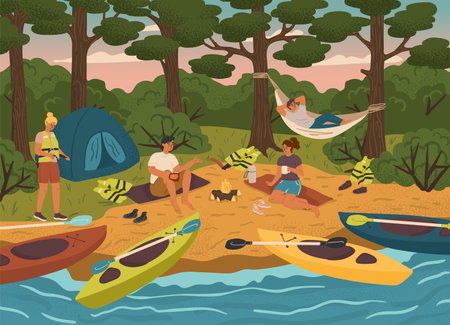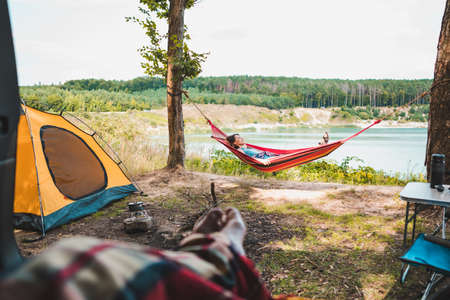1. Plan Ahead and Pack Smart
When heading out on a remote camping trip, one of the most important steps you can take to manage your trash responsibly is to plan ahead and pack smart. The more prepared you are, the less waste youll generate—and that means less impact on the pristine environment youre exploring.
Understand Local Regulations
Before you hit the trail or head into the backcountry, make sure to check the rules for the area youre visiting. Different national parks, forests, and public lands in the U.S. have different guidelines when it comes to trash disposal. Some areas may require you to pack out all waste, including food scraps and toilet paper, while others may provide bear-proof trash bins or composting toilets at designated spots.
Where to Find This Info:
- U.S. Forest Service websites
- National Park Service (NPS.gov)
- Visitor centers and ranger stations
Pack Reusable and Minimal-Waste Items
The best way to reduce trash is not to create it in the first place. By choosing reusable gear and avoiding single-use items, you’ll significantly cut down on what you have to carry out later.
Smart Packing Tips:
| Instead of… | Bring this… |
|---|---|
| Plastic water bottles | Reusable water bottle or hydration bladder |
| Single-use utensils | Durable metal or bamboo utensil set |
| Individually packaged snacks | Bulk snacks stored in reusable containers |
| Piles of paper towels | A few washable cloth rags or bandanas |
| Canned food with labels | Dehydrated meals in reusable bags |
Pre-Trip Food Prep Goes a Long Way
If you prep your meals before leaving home—like chopping veggies, portioning out meals, and removing excess packaging—you’ll not only save time at camp but also drastically cut down on unnecessary waste in the wild.
Bonus Tip:
Create a “trash-in, trash-out” bag system: bring one sealable bag for actual trash and another for recyclables (if you plan to sort them back at home). This keeps things organized and prevents smells or leaks in your backpack.
The bottom line? A little planning makes a big difference. Not only will you be more comfortable during your trip, but youll also leave nature just as beautiful as you found it.
2. Separate and Store Waste Properly
When youre deep in the backcountry, managing your trash responsibly becomes even more important. Separating and storing waste properly makes it easier to pack out everything you bring in, while also keeping your campsite clean and safe from wildlife. Heres how to do it right:
Use Durable, Sealable Bags or Containers
Choose tough, resealable bags or containers that won’t easily tear or leak. This helps contain odors and prevents spills in your backpack or vehicle. Make sure each bag or container is clearly labeled for its specific type of waste.
Sort Waste into Categories
Sorting your trash helps with both cleanliness and proper disposal once you’re back in civilization. Here’s a simple way to break it down:
| Category | Examples | Storage Tips |
|---|---|---|
| Recyclables | Cans, plastic bottles, paper | Rinse if possible; store in a separate bag or container |
| Food Scraps | Peels, leftovers, used napkins | Seal tightly to avoid attracting animals; consider odor-proof bags |
| Non-Recyclables | Used wrappers, hygiene products | Double-bag if needed to prevent leaks |
Keep Waste Away From Sleeping Areas
No matter how well-sealed your trash is, it can still attract curious critters. Store waste away from your tent—ideally in a bear-proof container or hung from a tree using proper bear-hang techniques if youre in bear country.
Quick Tip:
If youre camping with a group, designate one person as the “trash captain” each day to ensure everyone follows the sorting system and keeps things tidy.
Why It Matters
Properly separating and storing trash not only makes cleanup easier but also protects local wildlife and preserves the natural beauty of remote camping areas for others to enjoy.

3. Pack Out What You Pack In
When youre out in remote areas, trash doesnt just disappear — it sticks around and harms the environment. Following Leave No Trace principles means taking everything you bring with you back out, including items that seem harmless like fruit peels or paper towels. Even biodegradable items can take a long time to break down and may attract wildlife or disrupt natural ecosystems.
Why You Should Carry Out All Trash
Leaving trash behind — even small bits — can have big impacts. Animals might eat something they shouldn’t, or start depending on human food waste. Plus, other campers don’t want to see litter when they’re trying to enjoy nature. To keep wild spaces truly wild, it’s up to each of us to leave them better than we found them.
Common Items You Should Always Pack Out
| Item | Reason to Pack Out |
|---|---|
| Food scraps (e.g., apple cores, orange peels) | Attracts wildlife and takes time to decompose |
| Used toilet paper and hygiene products | Can contaminate water sources and are unsightly |
| Burned foil or packaging from campfires | Doesn’t fully burn and leaves toxic residue |
| Coffee grounds and tea bags | May contain microplastics and disrupt soil balance |
| Packing materials (plastic wrap, ziplock bags) | Lightweight trash that easily blows away into nature |
Pro Tip:
Bring a dedicated trash bag or container just for packing out waste. Some campers use odor-proof bags or bear-resistant containers if theyre in bear country. Having a system makes cleanup quick and easy!
4. Dispose at Designated Facilities
When youre camping in remote areas, its important to pack out all your trash and wait until you reach proper disposal sites before getting rid of it. Never leave garbage behind, even if its biodegradable—it can still harm wildlife and pollute the environment. Instead, hold onto your waste until you find an appropriate place to throw it away.
Where Can You Dispose of Trash Properly?
Here are some common places where you can responsibly discard your trash after a remote camping trip:
| Disposal Location | What You Can Dispose | Notes |
|---|---|---|
| Park Waste Stations | General trash, bagged waste | Usually found at trailheads or campgrounds within national/state parks |
| Visitor Centers | Recyclables, general waste | Some offer recycling bins—check signage for sorting rules |
| Local Recycling Facilities | Cans, plastics, paper, glass | Great option if youre near a town on your way home |
| Gas Stations or Rest Areas (with permission) | Small bags of trash | Ask staff if its okay before using their bins |
Tips for Responsible Disposal
- Keep trash sealed: Use durable trash bags or containers to prevent leaks and odors.
- Separate recyclables: If possible, sort your recycling while camping so it’s easier to dispose later.
- Avoid overflowing bins: If a bin is full, don’t pile your trash on top—find another disposal site.
- Respect local rules: Some areas have specific guidelines about what can be thrown away and where.
The Bottom Line
Packing out your trash and waiting until you reach a proper disposal facility is the best way to keep nature clean and safe for everyone. Whether it’s a park waste station or a recycling center in town, make sure your trash ends up where it belongs.
5. Avoid Burning or Burying Trash
When youre out in the backcountry, it might seem convenient to toss your trash into the campfire or dig a hole to bury it. But in reality, both methods do more harm than good. Burning trash can release toxic fumes into the air and leave behind non-biodegradable residue like melted plastics or metal scraps. Burying garbage might hide it from sight, but it won’t break down properly—and animals can still dig it up, leading to health hazards for wildlife and contamination of soil and water sources.
Why Burning or Burying Trash Is a Bad Idea
| Method | Environmental Impact | Wildlife Risk |
|---|---|---|
| Burning Trash | Releases toxic smoke, leaves pollutants behind | Residue may be ingested by animals |
| Burying Trash | Slows decomposition, contaminates soil | Attracts and harms wildlife that dig it up |
Stick to Safe Disposal Practices
The best practice is to pack out all your trash, including food scraps, wrappers, hygiene products, and anything else you bring with you. Bring heavy-duty trash bags or reusable containers to store waste securely until you can dispose of it properly at a designated facility. If youre dealing with particularly smelly items or things that could leak, double-bag them and store them in a bear-proof container when necessary.
Quick Tips for Responsible Waste Handling:
- No fire-pit dumping: Use fires only for clean-burning wood—not garbage.
- No burying: Even biodegradable items like fruit peels can disrupt local ecosystems.
- Treat your campsite like home: Leave no trace behind—if you packed it in, pack it out.
By avoiding burning and burying trash, youre helping preserve the natural beauty of remote camping spots and protecting the wildlife that calls those places home.


